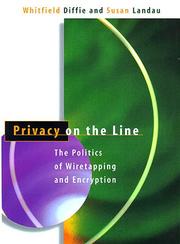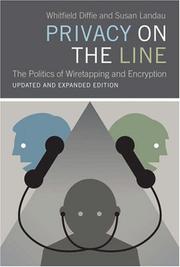| Listing 1 - 7 of 7 |
Sort by
|
Book
ISBN: 9780300227444 0300227442 Year: 2017 Publisher: New Haven Yale University press
Abstract | Keywords | Export | Availability | Bookmark
 Loading...
Loading...Choose an application
- Reference Manager
- EndNote
- RefWorks (Direct export to RefWorks)
"New technologies have provided both incredible convenience and new threats. The same kinds of digital networks that allow you to hail a ride using your smartphone let power grid operators control a country's electricity--and these personal, corporate, and government systems are all vulnerable. In Ukraine, unknown hackers shut off electricity to nearly 230,000 people for six hours. North Korean hackers destroyed networks at Sony Pictures in retaliation for a film that mocked Kim Jong-un. And Russian cyberattackers leaked Democratic National Committee emails in an attempt to sway a U.S. presidential election. And yet despite such documented risks, government agencies, whose investigations and surveillance are stymied by encryption, push for a weakening of protections. In this accessible and riveting read, Susan Landau makes a compelling case for the need to secure our data, explaining how we must maintain cybersecurity in an insecure age."--Inside dust jacket.
Book
ISBN: 9780262518741 9780262015301 9780262295581 026229558X 0262015307 Year: 2010 Publisher: Cambridge, Mass. : MIT Press,
Abstract | Keywords | Export | Availability | Bookmark
 Loading...
Loading...Choose an application
- Reference Manager
- EndNote
- RefWorks (Direct export to RefWorks)
Telecommunication --- Wiretapping --- Data encryption (Computer science) --- Electronic surveillance --- Computer crimes --- Télécommunications --- Ecoute électronique --- Chiffrement (Informatique) --- Surveillance électronique --- Criminalité informatique --- Security measures --- Government policy --- Political aspects --- Risk assessment --- Sécurité --- Politique gouvernementale --- Aspect politique --- Evaluation du risque --- Télécommunications --- Ecoute électronique --- Surveillance électronique --- Criminalité informatique --- Sécurité
Book
ISBN: 9780262363822 0262363828 9780262363815 026236381X 9780262045711 Year: 2021 Publisher: Cambridge, Massachusetts : The MIT Press
Abstract | Keywords | Export | Availability | Bookmark
 Loading...
Loading...Choose an application
- Reference Manager
- EndNote
- RefWorks (Direct export to RefWorks)

ISBN: 0262041677 0262541009 0262271745 0585002878 9780262041676 Year: 1998 Publisher: Cambridge, Mass. : MIT Press
Abstract | Keywords | Export | Availability | Bookmark
 Loading...
Loading...Choose an application
- Reference Manager
- EndNote
- RefWorks (Direct export to RefWorks)
Wiretapping --- Data encryption (Computer science) --- Privacy, Right of --- Law and legislation --- #SBIB:309H1015 --- Media: politieke, juridische, ethische, ideologische aspecten (incl. privacy) --- Wiretapping - United States --- Data encryption (Computer science) - Law and legislation - United States --- Privacy, Right of - United States
Book
Year: 1974 Publisher: Gaithersburg, MD : U.S. Dept. of Commerce, National Institute of Standards and Technology,
Abstract | Keywords | Export | Availability | Bookmark
 Loading...
Loading...Choose an application
- Reference Manager
- EndNote
- RefWorks (Direct export to RefWorks)

ISBN: 9780262256018 0262256010 9780262042406 1282096265 9786612096266 0262262517 0262514001 0262042401 9780262514002 Year: 2010 Publisher: Cambridge, Massachusetts ; [Piscataqay, New Jersey] MIT Press IEEE Xplore
Abstract | Keywords | Export | Availability | Bookmark
 Loading...
Loading...Choose an application
- Reference Manager
- EndNote
- RefWorks (Direct export to RefWorks)
Telecommunication has never been perfectly secure. The Cold War culture of recording devices in telephone receivers and bugged embassy offices has been succeeded by a post-9/11 world of NSA wiretaps and demands for data retention. Although the 1990s battle for individual and commercial freedom to use cryptography was won, growth in the use of cryptography has been slow. Meanwhile, regulations requiring that the computer and communication industries build spying into their systems for government convenience have increased rapidly. The application of the 1994 Communications Assistance for Law Enforcement Act has expanded beyond the intent of Congress to apply to voice over Internet Protocol (VoIP) and other modern data services; attempts are being made to require ISPs to retain their data for years in case the government wants it; and data mining techniques developed for commercial marketing applications are being applied to widespread surveillance of the population. In Privacy on the Line, Whitfield Diffie and Susan Landau strip away the hype surrounding the policy debate over privacy to examine the national security, law enforcement, commercial, and civil liberties issues. They discuss the social function of privacy, how it underlies a democratic society, and what happens when it is lost. This updated and expanded edition revises their original - and prescient - discussions of both policy and technology in light of recent controversies over NSA spying and other government threats to communications privacy.
Wiretapping --- Data encryption (Computer science) --- Privacy, Right of --- Law and legislation --- Electronic intelligence --- Electronic surveillance --- Telecommunication --- Political aspects --- INFORMATION SCIENCE/Communications & Telecommunications --- INFORMATION SCIENCE/Technology & Policy --- Electric communication --- Mass communication --- Telecom --- Telecommunication industry --- Telecommunications --- Communication --- Information theory --- Telecommuting --- Electronics in surveillance --- SIGINT (Electronic surveillance) --- Signals intelligence --- Surveillance, Electronic --- Remote sensing --- Electronic spying --- ELINT (Electronic intelligence) --- Intelligence, Electronic --- Intelligence service --- Military intelligence --- Electronic countermeasures --- Human rights, civil rights --- Communications engineering / telecommunications
Book

ISBN: 9789655391695 Year: 2018 Publisher: Tel Aviv Tel Aviv Museum of Art
Abstract | Keywords | Export | Availability | Bookmark
 Loading...
Loading...Choose an application
- Reference Manager
- EndNote
- RefWorks (Direct export to RefWorks)
Art styles --- Painting --- easel paintings [paintings by form] --- Modern [style or period] --- art collections --- Impressionist [style] --- Museum of Art [Philadelphia, Pa] --- anno 1800-1999 --- Europe
| Listing 1 - 7 of 7 |
Sort by
|

 Search
Search Feedback
Feedback About UniCat
About UniCat  Help
Help News
News